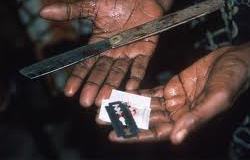Uganda joins global anti-FGM initiative
By Sharon Tibenda
13th Feb 2012:
The government of Uganda has joined an international initiative backed the United Nations [UN] to end the ancient practice of female genital mutilation [FGM] which is practiced by the Sabiny people of eastern Uganda and many other communities across Africa, Asia, and the Middle East.
The initiative is being carried out in 15 African countries: Burkina Faso, Djibouti, Egypt, Eritrea, Ethiopia, Gambia, Guinea, Guinea-Bissau, Kenya, Mali, Mauritania, Senegal, Somalia, Sudan and Uganda.
It includes engaging all community groups, such as traditional and religious leaders, women, men and young girls themselves, in discussing the harmful effects of the practice, while highlighting that it is not a religious requirement. The programme also supports laws and policies against the practice.
A new United Nations report has shown that almost 2,000 communities across Africa abandoned female genital mutilation/cutting (FGM/C) last year, prompting calls for a renewed global push to end this harmful practice once and for all.
According to the report issued by the UN Population Fund (UNFPA) and the UN Children’s Fund (UNICEF), the total number of communities renouncing FGM/C has now reached 8,000 over the last few years.
“…These encouraging findings show that social norms and cultural practices are changing, and communities are uniting to protect the rights of girls and women,” said UNFPA Executive Director Babatunde Osotimehin, on the International Day of Zero Tolerance to FGM/C, which is observed on 6 February.
To mark the Day, Dr. Osotimehin and UNICEF Executive Director Anthony Lake issued a joint statement renewing their commitment to put an end to the practice. “…We call on the global community to join us in this critical effort. Together, we can abolish FGM/C in one generation and help millions of girls and women to live healthier, fuller lives,” they stated.
FGM/C refers to a number of practices which involve cutting away part or all of a girl’s external genitalia. The practice – recognized globally as a violation of the human rights of girls and women – has no health benefits, causes severe pain and has several immediate and long-term health consequences, according to UN agencies.
Each year, around three million girls and women – or some 8,000 girls each day – face the risk of mutilation or cutting. An estimated 130 million to 140 million girls and women have undergone the practice, mostly in Africa and some countries in Asia and the Middle East.
The new report is prepared by the UNFPA-UNICEF Joint Programme for the Acceleration of the Abandonment of FGM/C, which was set up in 2008 and tries to spur change through a culturally sensitive, human rights-based approach that promotes collective abandonment of the practice.
US Secretary of State Hillary Clinton also added her voice to calls to the end the practice. “…Every government has an obligation to protect its citizens from such abuse. As we commemorate International Day of Zero Tolerance and remember those who have been harmed, we reaffirm our commitment to overturning deeply entrenched social norms and abolishing this practice.” the US top diplomat said.
She added that, “…all women and girls, no matter where they are born or what culture they are raised in, deserve the opportunity to realize their potential.” END. Please login to www.ugandacorrespondent.com every Monday to read our top stories and anytime mid-week for our news updates.
![]()


